Ruminate: Word Meaning, Examples, Origin & Usage in IELTS
5 min read
Updated On
-
Copy link
The word ‘ruminate’ means ‘to think carefully for a long period about something’. Explore its origin and history, usage, synonyms, and antonyms, & practice using it with the provided exercises to improve your IELTS vocabulary and achieve a Band 8+ score.
Table of Contents

Limited-Time Offer : Access a FREE 10-Day IELTS Study Plan!
In a world flooded with distractions from various sources, slowing down to reflect and analyse is rare. However, in thoughtful writing, complex conversations, or reflective speech, the ability to express deep thinking is essential. That’s where the word ‘ruminate’ comes into play. It is more than just thinking and learning this word can help you showcase your advanced vocabulary in the IELTS exam.
In this blog, we will explore the meaning, origin, and formal usage of ruminate, examine IELTS-specific examples, synonyms and antonyms of the word, and practice exercises to help you confidently use this powerful word in your speaking and writing.
Meaning of Ruminate
Pronunciation: /ˈruːmɪneɪt/ (sounds like ‘roo·muh·nayt’)
The word ‘ruminate’ is a verb that means to think deeply and carefully about something, often in a prolonged or repetitive way. However, it may also have a more negative connotation when someone is dwelling on distressing thoughts or regrets, especially in psychological contexts.
History and Origin of Ruminate
The word ‘ruminate’ comes from the Latin root “ruminare”, meaning ‘to chew the cud’, a behavior observed in animals like cows and goats. Just as these animals chew, swallow, and regurgitate food multiple times, the word metaphorically extended to describe humans turning thoughts over and over in their minds.
|
Root Word |
Language |
Meaning |
|---|---|---|
|
Ruminare |
Latin |
To chew again, to ponder |
|
Rumen |
Latin |
The first stomach of ruminants (cows, etc.) |
Over time, the literal sense evolved into a figurative one, giving us the modern use of ‘ruminate’ as deep or repeated thinking.
Learn how to maximize your word power for the IELTS exam!
Book a free IELTS online class
Usage & Examples of Ruminate
Used in both everyday English and formal writing (including IELTS essays), ruminate enriches your ability to describe mental depth and emotional introspection. Here are example sentences using ‘ruminate’ in different contexts:
- I have ruminated for months about whether to tell him about my pregnancy.
- I suggest the committee ruminate over the implications of its decision to permit fireworks on New Year’s Eve.
- Our ethics class had us ruminating on the nature of morality.
- The Clinton campaign should ruminate on whether its statements were a bit too incendiary in this sensitive climate.
- It is counterproductive to ruminate over mistakes that have already happened.
- One of my favourite things to do is to pour myself a drink and ruminate on the positive events of the day.
- I had to ruminate on my job offer for a few days.
- The meat of ruminating animals – animals that chew the cud – is an important part of our diet.
- Last Sunday’s church sermon was so impactful that the members of the congregation were ruminating on it for the next few days.
- She ruminated for days over whether she had made the right decision.
- Philosophers often ruminate on abstract questions about life and morality.
- He lay awake, ruminating on the argument he had with his friend.
Book a FREE demo to talk to our experts and boost your IELTS vocabulary now!
IELTS Usage of ‘Ruminate’
Using ruminate in IELTS Writing Task 2 or Speaking Part 3 shows a command of nuanced vocabulary. It is ideal for topics related to decision-making, emotional well-being, societal issues, or moral dilemmas.
Speaking Part 3 Example:
- Question: Do people today take time to reflect before making decisions?
- Answer Excerpt: “Not always. In fact, the pace of modern life leaves little time to ruminate on important choices, which can lead to impulsive actions.”
IELTS Writing Task 2 Example:
- Topic: People today are more stressed than in the past. To what extent do you agree or disagree?
- Answer Excerpt: One major reason why modern individuals experience higher stress levels compared to earlier generations is the tendency to ruminate, to dwell excessively on past choices, missed opportunities, or potential failures. In today’s hyper-competitive and performance-driven culture, people are often bombarded with idealised portrayals of success on social media and professional platforms.
Synonyms of Ruminate
In the table, you will find some close synonyms for IELTS Writing and Speaking of the word ‘ruminate’, each explained by meaning and complete with a sample sentence.
|
Synonym |
Meaning |
Example |
|---|---|---|
|
Ponder |
think about (something) carefully, especially before making a decision or reaching a conclusion |
He pondered the consequences carefully. |
|
Contemplate |
to view or consider with continued attention |
She contemplated the meaning of happiness. |
|
Reflect |
to think carefully, especially about possibilities and opinions |
He reflected on his school days with a smile. |
|
Mull over |
to think about something carefully and for a period of time |
I’ll mull it over tonight. |
|
Deliberate |
to think or talk seriously and carefully about something |
The committee deliberated for hours. |
Do you want to use impressive words to succeed in your IELTS exam?
Begin with our Vocabulary for IELTS!
Antonyms of Ruminate
In the table below, you will find some antonyms, or opposites of the word, ruminate, to boost your IELTS vocabulary.
|
Antonym |
Meaning |
Example |
|---|---|---|
|
Ignore |
to intentionally avoid thinking |
She ignored the issue instead of facing it. |
|
Overlook |
fail to notice or consider |
He overlooked an important detail in the report. |
|
Dismiss |
reject as unworthy of thought |
The idea was quickly dismissed by the team. |
|
Act on impulse |
make decisions without thinking |
He bought the car on impulse without ruminating at all. |
Exercises to Master the Meaning of Ruminate
Now it is time to take the following exercises to improve your understanding of the meaning of the word ‘ruminate’ and use it appropriately for an IELTS band score of 8 and above.
Exercise A: Choose the sentence where ‘ruminate’ is used correctly.
1 A He ruminated the email to check for grammar mistakes.
B They ruminated on the best way to approach the negotiation.
C She ruminated her friend a birthday card last night.
2 A The team ruminated the trophy with pride.
B I ruminated on whether I should accept the offer or wait for a better one.
C The actor ruminated the role with excitement.
Exercise B: Paraphrase the given sentences using ‘ruminate’.
1 He kept replaying the conversation in his mind.
2 They couldn’t stop thinking about the consequences of their decision.
3 Before making a final choice, she thought deeply about all the options.
4 I was stuck in a loop of overthinking my past mistakes.
Answer Key
|
Exercise A |
Exercise B |
|---|---|
|
1. B (‘Ruminated on’ is correctly used to mean thinking deeply or carefully about something.) 2. B |
1. He continued to ruminate on the conversation. 2. They ruminated on the consequences of their decision. 3. She ruminated over all the options before making a final choice. 4. I was constantly ruminating on my past mistakes. |
To conclude, the word ‘ruminate’ is more than just a fancy synonym for ‘think’. It expresses depth, persistence, and often emotion. In academic writing, personal essays, and even IELTS responses, it shows that you can articulate not just what someone thinks, but how and why they think. So, practice this word in multiple contexts to ensure it comes naturally during your IELTS Speaking or Writing exam.
Useful Links:
- Garrulous: Word Meaning, Examples, Origin & Usage in IELTS
- Vapid: Word Meaning, Examples, Origin & Usage in IELTS
- Dissemination: Word Meaning, Examples, Origin & Usage in IELTS
- 1200 Common Words in IELTS Listening to Boost Vocabulary
- Synonyms for IELTS Writing: The Ultimate Guide to Score High
- Useful Resources & Websites for IELTS Vocabulary
Explore IELTS Resources

Start Preparing for IELTS: Get Your 10-Day Study Plan Today!
Check out other Word of the Day Articles
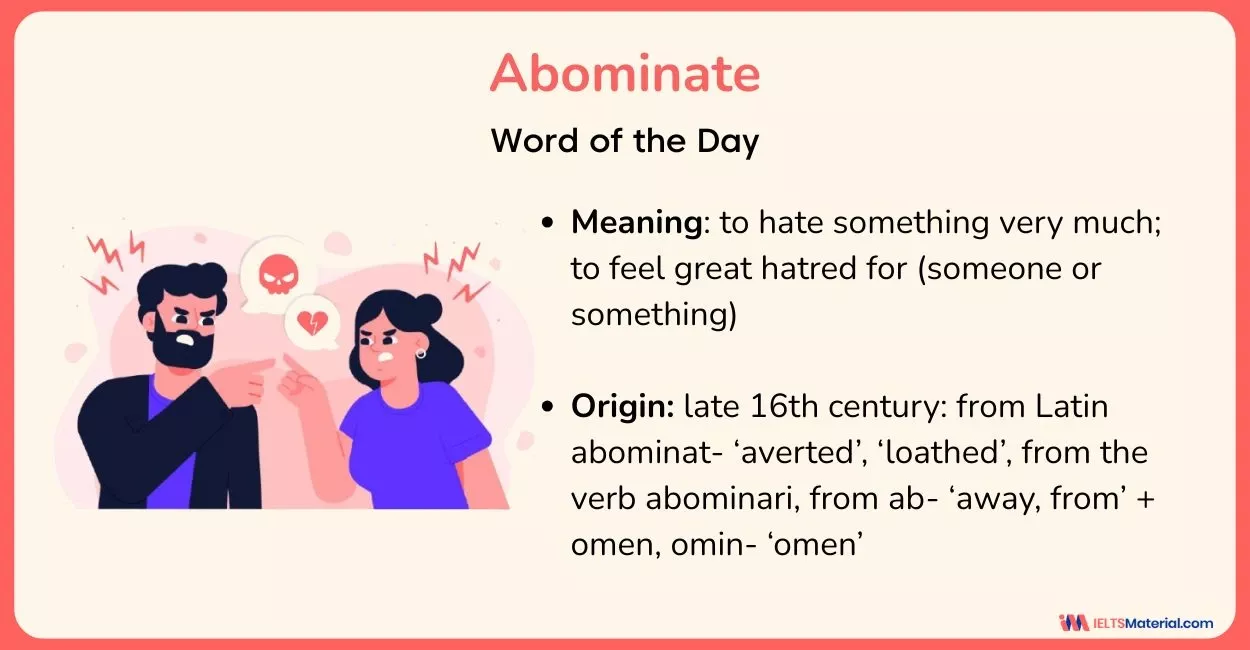
Haniya Yashfeen
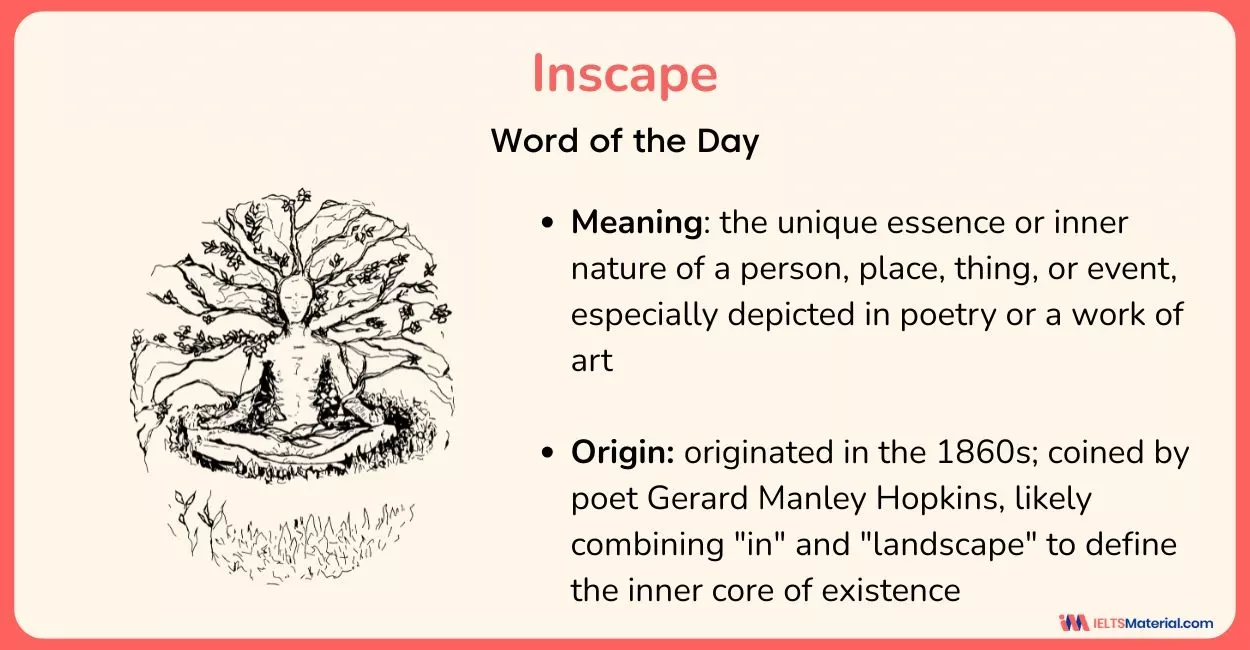
Prity Mallick
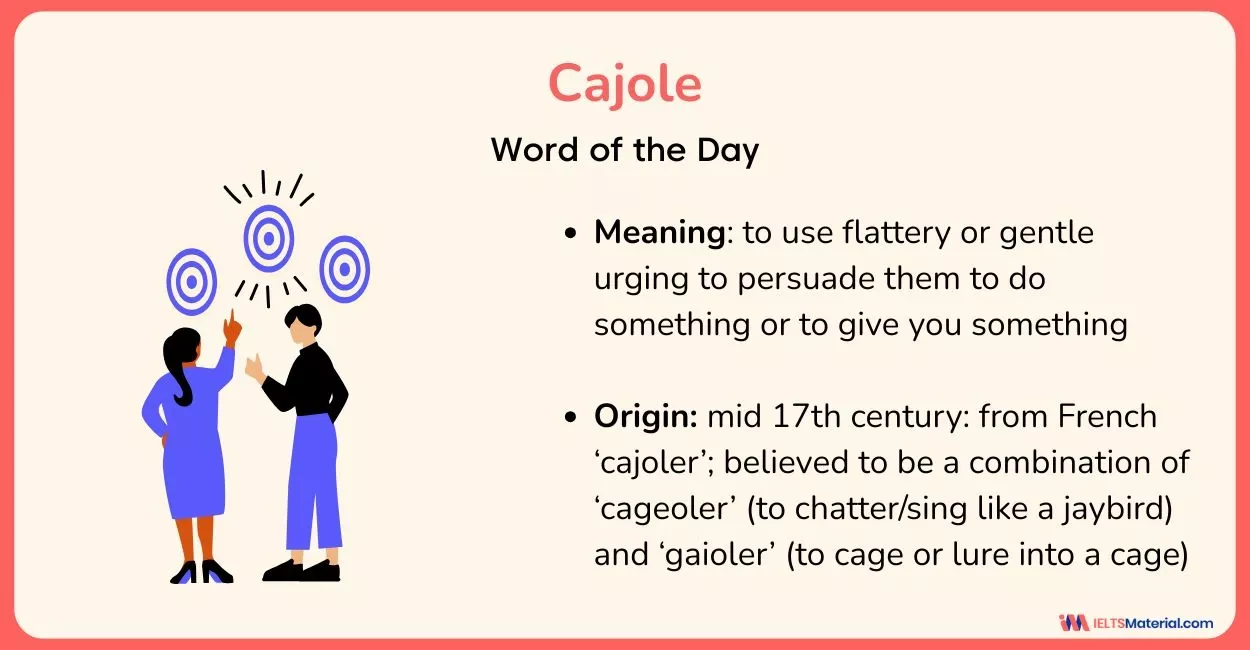
Prity Mallick
Recent Articles
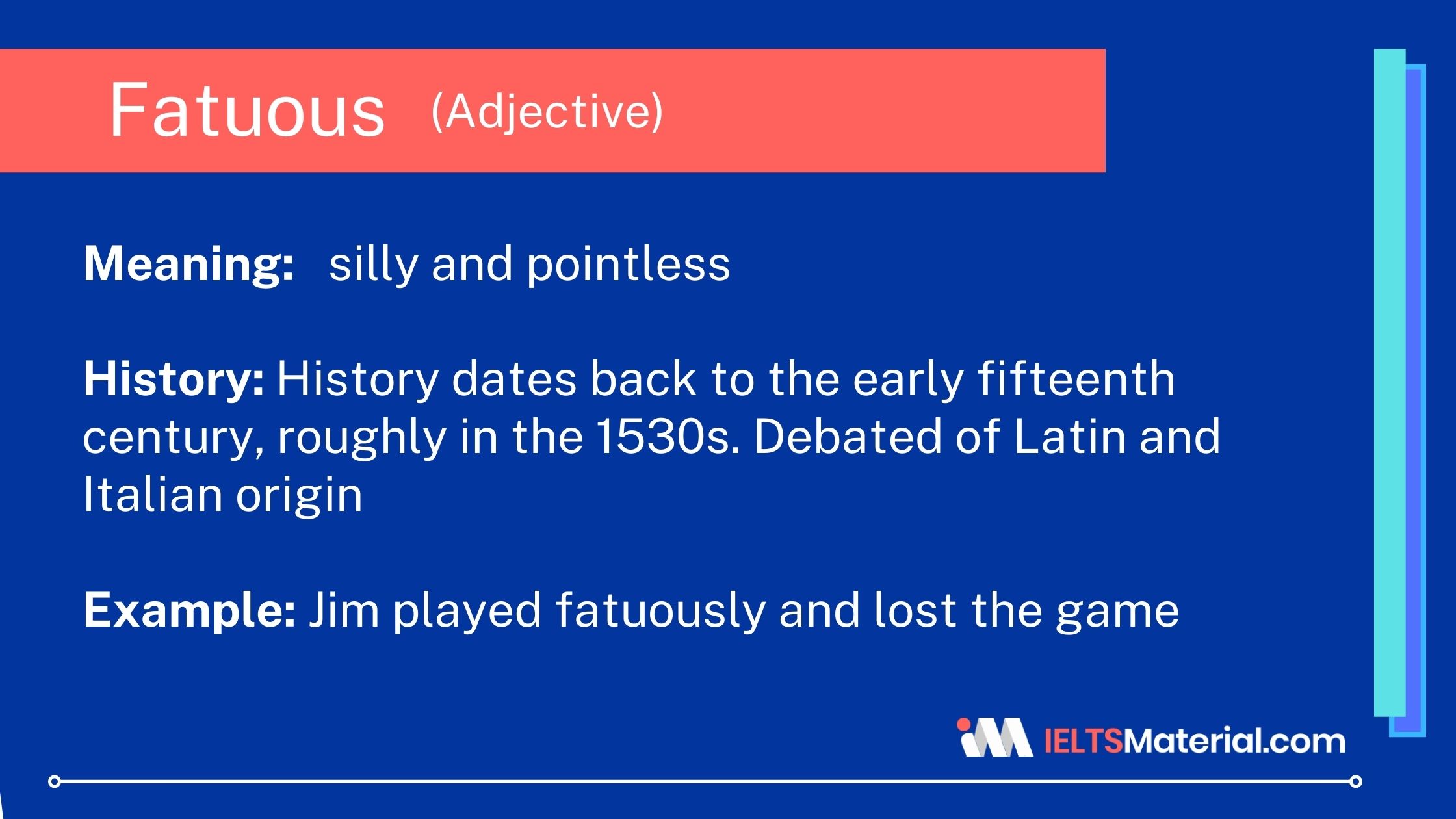
Kasturika Samanta
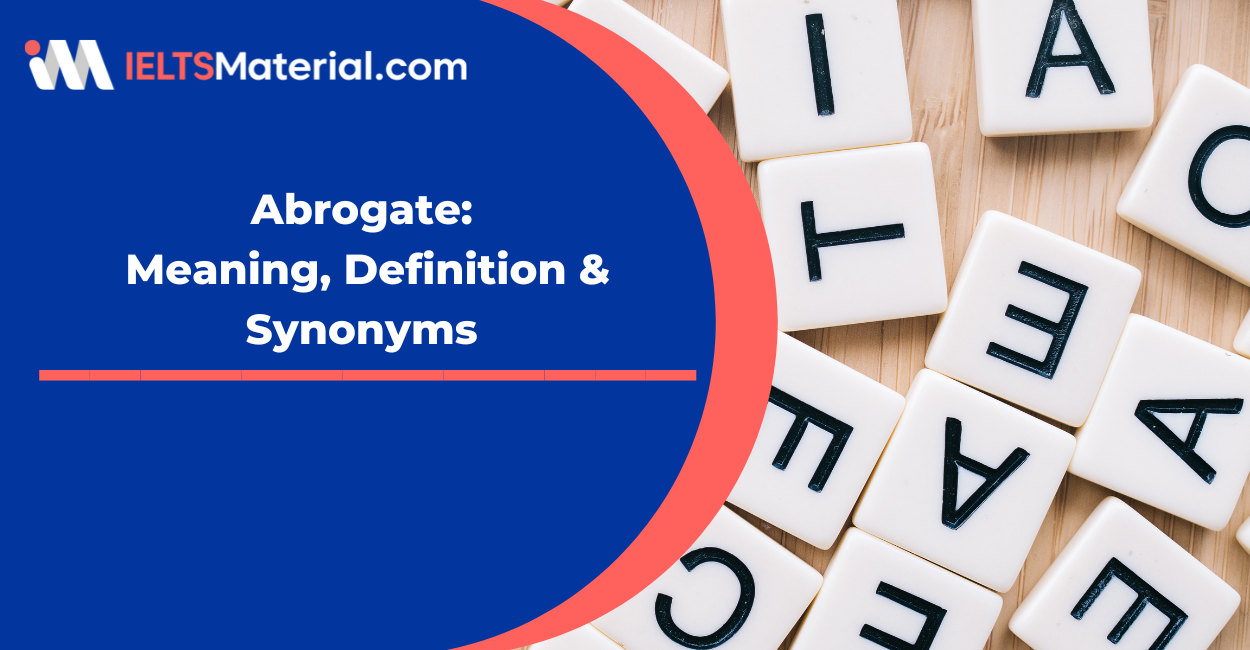
Kasturika Samanta
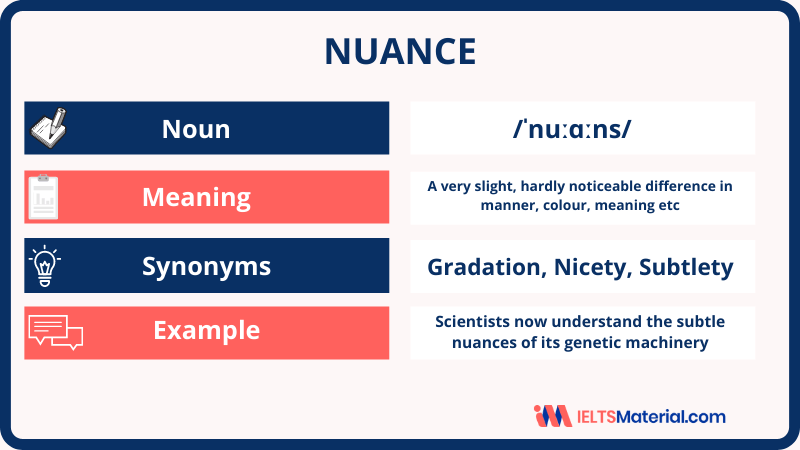
Kasturika Samanta
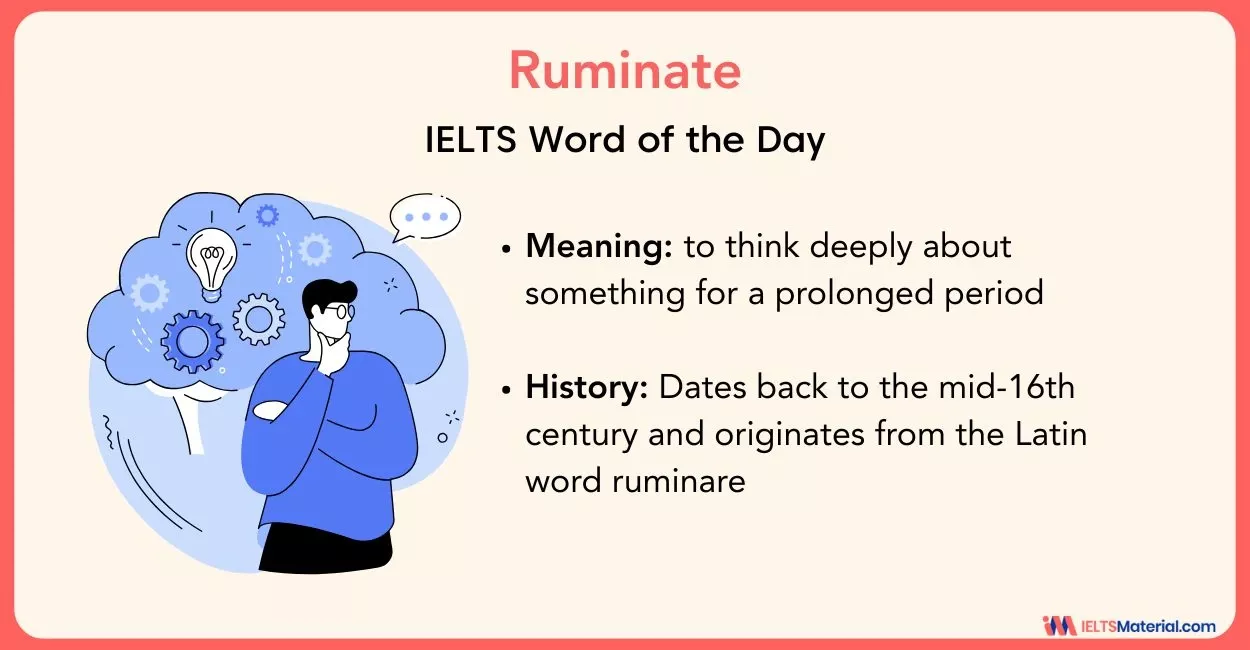

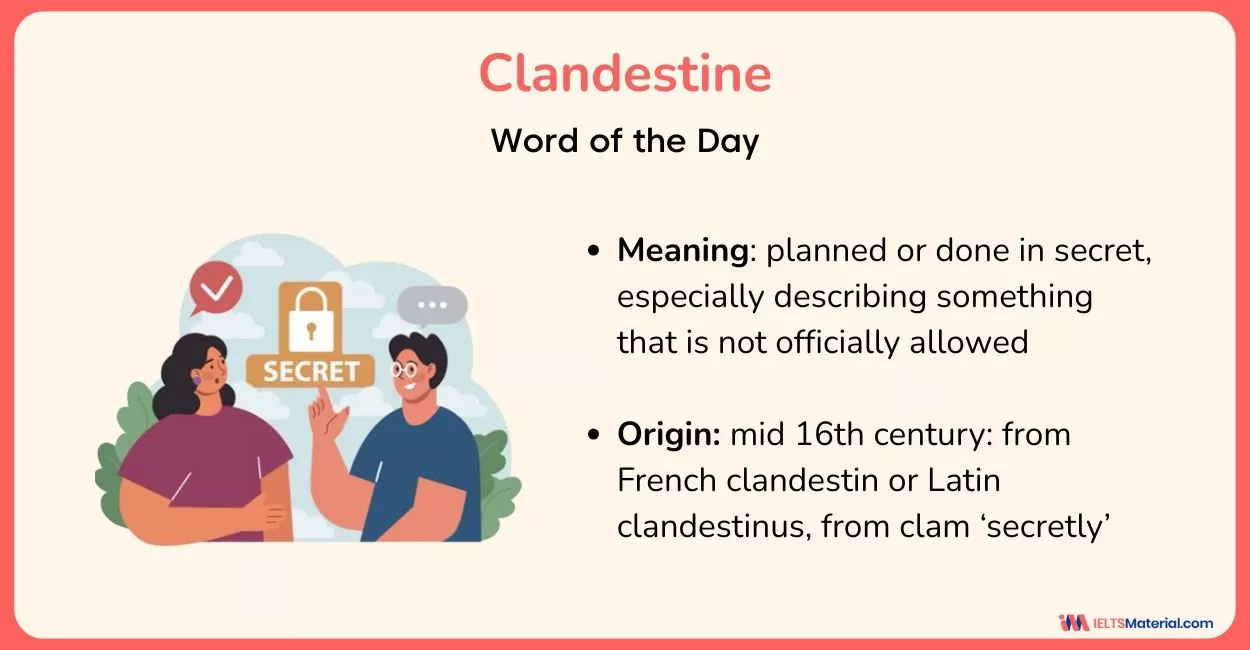



Post your Comments